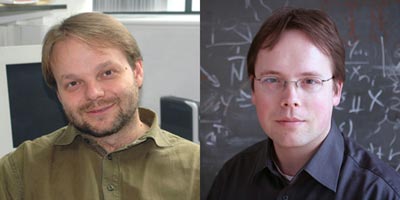June 27, 2012
Two exceptional awards for IST Austria scientists
EMBO Gold Medal for Jiří Friml • ERC Starting Grant for Christoph Lampert for project on “Life-Long Learning for Visual Scene Understanding” • Eleventh ERC Grant for IST Austria Professors

Two exceptional distinctions have been awarded to the two IST Austria professors Jiří Friml and Christoph Lampert. The Institute of Science and Technology (IST) Austria has been informed by the European Research Council that Professor Christoph Lampert has been endowed with an ERC Starting Independent Researchers Grant (aka Starting Grant). The grant for Lampert who works on Computer Vision and Machine Learning is funded with € 1.5 mio for the duration of five years. This is the eleventh ERC Grant for the IST Austria faculty of 24 professors.
Jiří Friml has been awarded with the EMBO Gold Medal 2012. The European Molecular Biology Organization (EMBO) with this distinction highlights the quality of molecular biology research being performed by young European scientists. Friml is in the process of moving to IST Austria and will start his work with the completion of the second lab building in the fall of this year. The EMBO Gold Medal – bestowed upon only one scientist per year – is regarded as one of the most prestigious European awards in this field.
President Thomas Henzinger expressed his appreciation: “The ERC grants have become a yardstick for measuring research excellence in Europe, being awarded only to the very best scientists as chosen by their peers. I congratulate Christoph Lampert on this success and look forward to his contributions. The distinction for Jiří Friml is equally rewarding. It once more highlights his potential and his abilities. We, at IST Austria, regard these awards as confirmation of our strategy to attract the most promising scientists in their fields.” IST Austria professors have so far acquired € 25 mio in research grants, 90% coming from sources outside of Austria.
The goal in Lampert’s “Life-Long Learning for Visual Scene Understanding” project is to develop and analyze algorithms that use continuous, open-ended machine learning from visual input data (images and videos) in order to interpret visual scenes on a level comparable to humans. The ERC project is based on the hypothesis that in order to significantly improve the state of the art in computer vision, the scientists need to give the algorithms access to background and contextual knowledge about the visual world. The most feasible way to obtain such knowledge is by extracting it (semi-)automatically from incoming visual stimuli. Consequently, at the core of the project lies the idea of life-long visual learning.
The project is placed on the interface between computer vision and machine learning. The techniques developed in the course of the project will also have impact outside of these areas, because they can help giving ”common sense” to automatic learning systems that so far have none. Further application lies in all data-rich sciences, where it has also become too time-consuming to manually annotate every measured data sample, e.g. in bioinformatics and bio-imaging. Even projects of commercial value, such as more intelligent driver assistance or video surveillance systems, based on the project are easily imaginable.
Lampert joined IST Austria in 2010. He was born in 1974, studied Mathematics at the University of Bonn, Germany, where he finished his thesis in 2003. He held positions at the German Research Center for Artificial Intelligence (DFKI) in Kaiserslautern and at Google Inc. in the USA before moving to the Max-Planck-Institute for Biological Cybernetics in Tübingen in 2007. Until 2010 Lampert was a Senior Research Scientist in the group of Bernhard Schölkopf where he headed the Computer Vision Laboratory.
ERC Starting Independent Researcher Grants (ERC Starting Grants) aim to support up-and-coming research leaders. The scheme targets promising researchers who have the proven potential of becoming independent research leaders. The grants intend to support the creation of new excellent research teams or to strengthen others that have recently been created.
Jiří Friml is a plant cell biologist who obtained one PhD from the University of Cologne, and a second from Masaryk University in Brno. After having worked at the universities of Tübingen and Göttingen Friml, in 2007, joined the Flanders Institute for Biotechnology (VIB) in Gent, Belgium, as full professor. In 2011, he received an ERC Starting Grant supporting his research in polarity and subcellular dynamics in plants. Friml was awarded the Körber European Science Award in 2010, and elected EMBO member in 2010 and AAAS fellow in 2011.
Jiří Friml studies signal integration during plant development. Using a combination of genetics and high-resolution microscopy, he investigates how the integration of external signals, such as light or gravity, with cell polarity and intracellular trafficking translates into the development of the plant. In his research, Friml seeks to uncover the cellular and molecular mechanisms providing plant development with its unique abilities to adapt. His interdisciplinary research program is positioned at the intersection of molecular physiology, cell and developmental biology as well as evolutionary biology.
Founded in 1964 the European Molecular Biology Organization (EMBO) is an organization of leading life scientist members that fosters new generations of researchers to produce world-class scientific results with the aim to raise the level of biological research in Europe by setting the highest standards to achieve scientific excellence. Winners of the EMBO Gold Medal receive a hand-crafted medal and a bursary of € 10.000. EMBO invites the recipient to present his research during the award ceremony held at the annual scientific conference, this year in November in Heidelberg.



